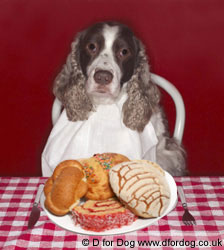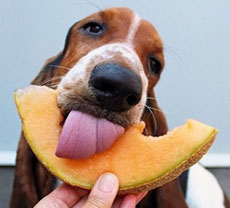Human Foods Toxic to Dogs
While dogs love human foods and it can be nice to occasionally feed them some scraps, are you sure exactly which human foods are safe and which are not safe to feed your dog?

Some food items are pretty obvious. We know we shouldn't give our dogs cakes, fatty foods, salty foods, bird bones etc... Some are less obvious.
Here are some human foods to be wary of and feed in small quantities or completely avoid feeding your dog:
Chocolate
Chocolate contains Theobromine which can cause increased heart rate, restlessness and vomiting. Theobromine poisoning is one of the most commonly encountered poisonings in pet dogs and it can be fatal. Theobromine is found in chocolate, cocoa, cola and tea. See our article Chocolate is Poisonous to Dogs.
Grapes and Raisins
Grapes and raisins are toxic to dogs and can cause renal failure. Again they can be fatal, even in small amounts. Currants and sultanas are included in this category. Seek veterinary help immediately if your dog eats these foods. Some dogs can cope with eating a few but many cannot and you have no idea which way your dog may react so don’t risk it.
Onions
They can damage your dog's red blood cells leading to severe anaemia and should be avoided, along with other bulb vegetables such as chives, leeks, shallots and garlic.

Garlic
As mentioned, garlic is part of the onion family. It is toxic to dogs and should be avoided. Giving garlic in very small doses is (or was) relatively common but is becoming an increasingly contentious issue. Some owners use garlic tablets as a natural flea repellent and for general health. Always follow doses carefully and consider doing a regime such as one week on, one week off if giving garlic as a health supplement, or research alternatives. It is widely understood now that while a little bit of garlic is not necessarily toxic to your dog it can have a dangerous cumulative effect over time.
Dairy Products
Lactose, which is found in milk and dairy products, is not digestible to dogs and can cause tummy upsets and loose stools. Cheese is quite low in lactose, compared to say milk, so as long as your dog is not lactose intolerant, a small cube or two of cheese as a training treat should be fine but do watch out for reactions and changes in your dog's stools. Apart from anything else, dairy products are rich and fatty, so are not great for dogs.
Fruit

Fruit can be high in sugar and can also be acidic, which is bad for teeth. Fruit can upset your dog's digestion and is best avoided or fed as a small treat only. Always remove pips and stones from fruit first, not only because of the potential choking hazard but because of the cyanide content. The fruit to avoid completely is rhubarb. The stalk of the plant and also its leaves are toxic to dogs. Avocados (the flesh and stone) should also be completely avoided as they contain a substance that is toxic to dogs.
Potatoes
Feeding potatoes is not recommended due to their high starch content, which is not very digestible to dogs and may cause problems. If you wish to give potato as a treat, only give a small amount of plain mashed or boiled potatoes with nothing else added (e.g. salt, butter). Moderation is important.
Xylitol (Artificial Sweetener)
The artificial sweetener Xylitol triggers a sudden release of insulin in dogs, causing a dramatic drop in blood sugar and can lead to liver damage. Xylitol is a sweetener used in many human products, especially sugar free foods as well as sweets and cakes. In particular, be careful with ingredients if you give your dog sugar-free yoghurts or peanut butter, which is a common 'stuffing' recipe in treat toys. These are just two examples but Xylitol is becoming increasingly difficult to avoid so please do always read the label. Not that Xylitol is always easy to spot. For advice, please read Peanut Butter & Dogs - Xylitol Warning.
Other Foods
You might also like to read our The Dog’s Christmas Dinner - what your dog can and can't eat blog, where we discuss other common foods such as eggs, veggies, gravy and more.
Other 'Edible' Dangers

Toxic Plants and Flowers
Many common household and garden plants and flowers can be toxic to dogs, causing anything from skin irritations to severe poisoning and death. Some of the more common examples are daffodils (especially the bulbs), lilies, azalea, foxgloves, rhubarb and more. Please read our Poisonous to Dogs - Toxic Plants and Flowers article.
Antifreeze
Ethylene glycol toxicosis is a type of poisoning that occurs after ingestion of antifreeze or other fluids containing the ingredient ethylene glycol. Antifreeze is the most common source of ethylene glycol. Animal poisoning by antifreeze is worryingly common as antifreeze is often accessible to pets and animals and it tastes great too. Ethylene glycol poisoning can be fatal if not treated soon after ingestion (within 4 to 8 hours). Seek veterinary help immediately. To find out more visit Antifreeze is Poisonous to Pets.
By Jenny Prevel
Disclaimer: D for Dog assumes no liability for the content of this article or the given lists. The lists may not represent all foods poisonous to dogs. Please also note that your dog may have a sensitivity or allergy to a food that is not mentioned on this list.
© D for Dog www.dfordog.co.uk
This article belongs strictly to D for Dog and we do not authorise the copying of all or any part of it.
